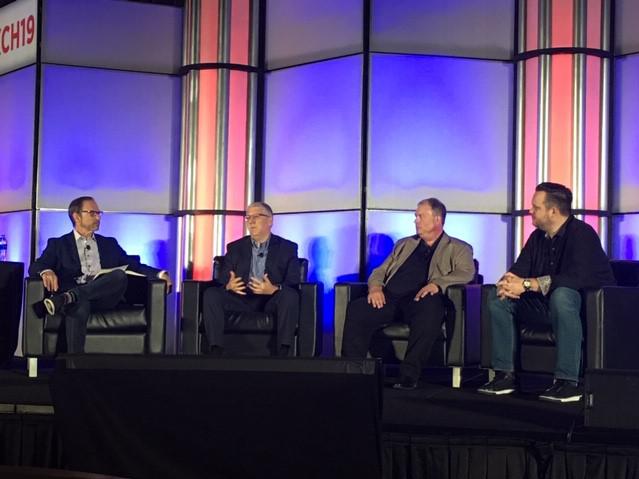MSP Panel: Move To Services Not Easy, But Worth The Hardship
MSP executives along with an analyst who used to be an MSP told an audience of their peers at this week's XChange conference that adopting a services-first business model is the way to grow and improve margins.

Shifting from a focus on products to services is not easy, but an MSP panel at this week's XChange 2019 conference in Denver showed that the hard work can pay off.
The panel, moderated by Ryan Walsh, chief channel officer at Pax8, a Littleton, Colo.-based cloud-based services distributor, also included Aaron Sherril, senior analyst for the 451 Research Group, who prior to becoming an analyst spent time working at an MSP.
Sherril told the MSP audience that one of the biggest trends happening in IT is that everyone is trying to become a service provider.
[Related: The MSP Business Is Evolving, And That Means Nothing But Opportunities]
"I think vendors are finally realizing the attractiveness of the service provider market," he said. "What we're seeing overall in the enterprise space is that the spend on hardware and software is declining. No surprises, right? That spend is moving towards services."
The industry hasn't yet reached the inflection point where services revenue has overtaken that of hardware and software, Sherril said. "But it's happening," he said. "And those vendors see that."
Vendors are taking one of two routes to the services business, Sherril said. The first is to see service providers as the route to market for the future, and the second is to become service providers themselves, he said.
Sherril said that when he works with vendors looking at becoming service providers, he advises them to not take the direct channel route.
"We're providing them with a focus on service providers for that route to market [to] enable service providers to deliver a more comprehensive portfolio of services to their customers," he said.
Daniel Johnson, president of MachineLogic, an Englewood, Colo.-based MSP, said his company gets a significant amount of its revenue from cloud services and from supporting cloud solutions.
"Almost all of our resources revolve around that recurring revenue model, whether we're doing a one-off project or just trying to enable [that] customer that's consuming an ever-growing amount of cloud solutions," he said.
MachineLogic's services growth has come from talking with customers about where they are heading and how to help them unleash their business, Johnson said. Many of those conversations revolve around finding the right mix of cloud services to bring into their businesses, whether that means a Microsoft-oriented solution or complementary solutions regarding security and data protection or even collaboration solutions, he said.
"We've really focused on how do we take that small and medium-sized business customer to the next level through cloud services," he said.
MachineLogic has had a strong services mix since the company was founded, but in the past few years has seen a big shift into much more services-centric customer engagements, Johnson said.
"[Customers are] looking for specific business outcomes," he said. "And that's not always accomplished by selling them the next server or the next network switch. They're looking for things that will enhance productivity or secure their business. And I think that by focusing on those services, we've seen a big rise in revenue."
Denton, Texas-based Techvera started in 2009 with the acquisition of a computer repair shop that drove to customer sites to provide services, CEO Reese Ormond said. However, after studying the market and attending channel events, it moved into managed services in 2014.
About 65 percent of Techvera's total revenue now comes from services, with the remainder coming from projects and hardware sales, Ormond said. The company went from zero dollars in monthly recurring revenue four and a half years ago to $130,000 per month now, and instead of requiring 50 clients to generate $100,000 in revenue it can now do so with five managed services customers with way more margins, he said.
It was a long process that included educating customers on what the company planned, Ormond said.
"We had to phase out our [previous] model," he said. "We had to honor those agreements. And to be quite honest, a lot of those clients did not convert to our managed service offering. It was a 2.5X or 3X spend. So if they spent $10,000 last year, [now] I was coming to them asking for $25,000. So learning how to sell that, learning the methodology, learning how to uncover all the things that were there that they really needed help with was a big deal."
The opportunity to show customers the collaboration and other capabilities related to cloud applications is important now thatMicrosoft Office 365 is a core part of Techvera's core managed service offering, Ormond said. "There's a lot of opportunity there," he said.
MachineLogic’s Johnson said that his company has never really had to "fire" a customer as a result of moving to a managed services focus.
"We're always looking for the right blend of customers," he said. "We want to make sure that we're a good fit for that customer, not only our services but also our culture. We want to help customers grow. A lot of times that conversation is about moving beyond product sales and really start talking about value and unlocking that potential within that customer."
When some customers do not want to grow, or are hesitant when it comes to price, there's usually a good reason for that, Johnson said.
"They might have had a bad experience, or they're not sure where their business direction might be," he said. "Really aligning our teams is key in that."
MachineLogic is doing some revenue replacement over time, Johnson said. "As an MSP evolves, you have to look at that and make sure that not only people and your team is right, but that your client mix is right."